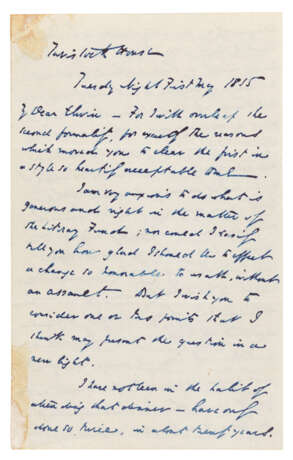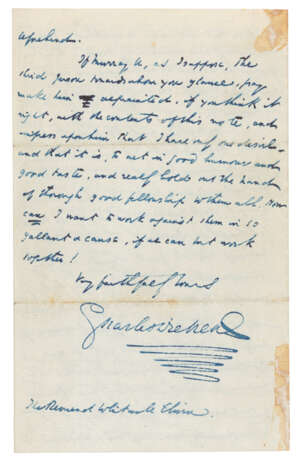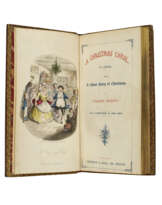ID 870784
Lot 52 | DICKENS, Charles (1812-1870)
Valeur estimée
£ 2 800 – 3 500
Autograph letter signed (‘Charles Dickens’) to the Reverend Whitwell Elwin, Tavistock House, [London], ‘Tuesday Night’, 1 May 1855.
Four pages, 179 x 111mm, bifolium. Provenance: With Maggs Bros, 1923, catalogue 443, item 1124 – Sotheby's, 22-23 November 1971, lot 275; bought by Bernard Quaritch.
On his efforts to reform the Royal Literary Fund. 'I am very anxious to do what is generous and right in the matter of the Literary Fund; nor could I easily tell you how glad I should be to effect a change so honorable to us all, without an assault'. Elwin has been under the impression that Dickens was planning not to attend the upcoming Literary Fund dinner whilst awaiting a vote on his proposed reforms, and has urged him to attend nevertheless. Dickens however points out that he has never been in the habit of attending the Literary Fund dinner: 'consequently my non-attendance is no new or marked thing. Then, observe. If I were there, I could hardly be there without speaking. The Bishop of Oxford [Samuel Wilberforce, chairman of the Fund] is not wholly free from that kind of land-seamanship which is expert in wearing and tacking; and he might (I do not say would), execute a manoeuvre or so which I might feel it necessary to reduce to the level of an ordinary straight-forward comprehension'. Even if this were not so, he very much fears that 'the authorities' of the Fund would prefer him not to come. 'Lastly I must confess for myself, that I could not possibly say anything without referring to my hopes of a change. And I am far from clear that this would be acceptable, however conciliatory and delicate my tone'. If Elwin continues to urge Dickens to attend, he will give it further thought: 'The difficulty however of being sure that I should not be a Nightmare to the Management will still remain, unless that Body and I can by some means or other be brought to a reciprocal assurance and understanding beforehand'. Elwin is free to communicate what he has said to John Murray, and underline to him above all that 'I have only one desire – and [...] it is, to act in good humour and good taste, and really hold out the hand of strong good fellowship to them all. How can I want to work against them in so gallant a cause, if we can but work together!'.
The Royal Literary Fund was founded in 1790 for the relief of financially distressed writers. Dickens was a member from 1837 to 1854, but became dissatisfied with its administration, and, having first founded the rival Guild of Literature and Art in 1851, by 1855 had hatched a scheme with Forster, Bulwer Lytton and Charles Wentworth Dilke to take over the Literary Fund itself. The present letter was written at the high water mark of this attempt, when the report of a Special Committee under Dickens was submitted to a vote by the members. After its rejection, Dickens was to continue his reforming campaign over the following five years, initially through internal pressure and latterly by public attacks – ultimately without success. Pilgrim Letters of Charles Dickens, ed. Graham Storey, Kathleen Tillotson, Angus Easson, vol. 7 (1993), pp.602-603.
| Artiste: | Charles Dickens (1812 - 1870) |
|---|---|
| Lieu d'origine: | Europe du Nord, Europe, Royaume-Uni |
| Catégorie maison de vente aux enchères: | Lettres, documents et manuscrits |
| Artiste: | Charles Dickens (1812 - 1870) |
|---|---|
| Lieu d'origine: | Europe du Nord, Europe, Royaume-Uni |
| Catégorie maison de vente aux enchères: | Lettres, documents et manuscrits |
| Adresse de l'enchère |
CHRISTIE'S 8 King Street, St. James's SW1Y 6QT London Royaume-Uni | |
|---|---|---|
| Aperçu |
| |
| Téléphone | +44 (0)20 7839 9060 | |
| Commission | see on Website | |
| Conditions d'utilisation | Conditions d'utilisation |













